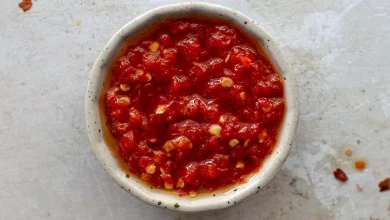🌰🤔 Almond Dukkah: A Nutty Adventure! 🌰🤔
Almond Dukkah is a delightful Middle Eastern spice blend and condiment that has gained popularity worldwide. It’s a versatile mixture of various nuts, seeds, and spices, and it’s often used as a dip with bread and olive oil, a seasoning for salads, or a crunchy coating for meats or vegetables. Here’s a deep dive into its history, components, preparation, and time required:
📜 History:
Dukkah (pronounced “doo-kah”) originates from Egypt and has been enjoyed for centuries. Its name comes from the Arabic word “to pound,” as the ingredients are traditionally crushed or pounded together. It was a staple in Egyptian cuisine, often served as an appetizer with bread and olive oil. Over time, it has evolved into various regional variations.
🧩 Components:
The components of Almond Dukkah can vary, but the core ingredients typically include:
- Almonds: Toasted almonds provide a rich, nutty base.
- Sesame Seeds: Adds a hint of earthiness and crunch.
- Coriander Seeds: Offers citrusy and floral notes.
- Cumin Seeds: Adds a warm, aromatic flavor.
- Salt: Enhances overall taste.
- Pepper: For a touch of heat.
- Optional Ingredients: You can get creative with variations, adding ingredients like hazelnuts, fennel seeds, or even dried herbs like thyme.
👨🍳 Preparation Steps:
Making Almond Dukkah is a delightful kitchen project. Here are the steps:
1. Toasting: Toast 1 cup of almonds and 1/4 cup of sesame seeds separately in a dry skillet over medium heat until fragrant and lightly golden. Be sure to stir frequently to prevent burning. Let them cool.
2. Spice Roasting: In the same skillet, toast 2 tablespoons of coriander seeds and 1 tablespoon of cumin seeds until fragrant. This should take about 2-3 minutes. Remove and let them cool.
3. Grinding: Once cooled, place the toasted almonds, sesame seeds, coriander seeds, and cumin seeds in a food processor or mortar and pestle. Add 1/2 teaspoon of salt and a pinch of pepper. 🔄 Grind or pulse until you achieve a coarse, crumbly texture. Be careful not to over-process; you want it to have some texture.
4. Store: Transfer your freshly made Almond Dukkah to an airtight container. It can be stored in a cool, dry place for several weeks.
⏲️ Time Required:
The preparation time for Almond Dukkah is approximately 20-30 minutes, including toasting and grinding. It’s a relatively quick and rewarding culinary endeavor that can elevate your dishes with its unique flavor and delightful crunch.
So, whether you’re sprinkling it on a salad 🥗, using it as a crust for chicken 🍗, or simply dipping some fresh bread 🥖 into olive oil and dukkah, you’re in for a flavorful adventure! Enjoy your culinary journey with this delightful blend of flavors and textures! 🌟🍽️😊
Certainly, here are the nutrition facts and some health information for Almond Dukkah:
Nutrition Facts (per 1 tablespoon of Almond Dukkah):
- Calories: Approximately 50-60 calories
- Total Fat: 4-5 grams
- Saturated Fat: 0.5 grams
- Monounsaturated Fat: 3 grams
- Polyunsaturated Fat: 1 gram
- Sodium: Varies depending on salt added (usually around 50-100 mg)
- Total Carbohydrates: 2-3 grams
- Dietary Fiber: 1-2 grams
- Sugars: 0 grams
- Protein: 2-3 grams
Health Information:
-
Healthy Fats: Almond Dukkah contains heart-healthy monounsaturated and polyunsaturated fats from almonds and sesame seeds. These fats can help reduce the risk of heart disease.
-
Protein: It provides a small amount of protein, which is essential for muscle repair and overall body function.
-
Fiber: The dietary fiber from almonds and sesame seeds can aid in digestion and help maintain a feeling of fullness.
-
Low Sugar: Almond Dukkah is typically sugar-free, making it a suitable choice for those looking to reduce sugar intake.
-
Sodium: The sodium content can vary depending on the amount of salt added during preparation. Be mindful of salt if you’re watching your sodium intake.
-
Vitamins and Minerals: Almond Dukkah contains various vitamins and minerals, including vitamin E, magnesium, and calcium, from the almonds and sesame seeds.
-
Versatility: You can use Almond Dukkah as a flavorful alternative to high-calorie condiments or as a coating for proteins and vegetables, which can make your meals more nutritious.
-
Portion Control: While Almond Dukkah can be a healthy addition to your diet, it’s calorie-dense, so portion control is important, especially if you’re mindful of your calorie intake.
Remember that the specific nutritional content may vary based on the ingredients and proportions you use when making Almond Dukkah. Overall, it can be a delicious and nutritious addition to your culinary repertoire when consumed in moderation.



